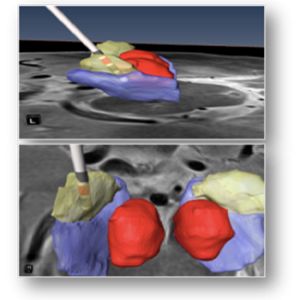Daniel Sexton, MD, Receives CNS Scholarship in Data Science
Duke Neurosurgery resident Daniel Sexton, MD, has been named recipient of the Congress of Neurological Surgeons Scholarship in Data Science for 2021.
Fecci Inducted Into the American Society for Clinical Investigation
Duke neurosurgeon Peter E. Fecci, MD, PhD, was inducted into the American Society for Clinical Investigation (ASCI) at an April 2021 join
Using Artificial Intelligence to Advance DBS Treatment for Parkinson's
At Duke, researchers are using artificial intelligence to building an antomical brain map for each individual patient, which will allow more neurosurgeons to be able to offer deep brain stimulation treatments to people with Parkinson's disease.
Duke Neurosurgery Celebrates Match Day 2021
On March 19, Duke Neurosurgery Match Day by welcoming three outstanding new residents to our program.
Getting to know Annick Desjardins
Some people fall into their life’s work by serendipity or happenstance. Annick Desjardins, MD, FRCPC, is not one of those people.
Treating the whole person: Carolyn Keeler, DO
Celebrating Women’s History Month
Before Carolyn Keeler, DO, was a doctor, she was a dancer.
Parents of Children with Cancer Have Additional Worries During COVID
A survey of caregivers finds that most experienced instances of delayed care and other stresses.
Duke, Sampson rank at the top in NIH funding for 2020
The Duke Department of Neurosurgery has been ranked fourth for neurosurgery research funding from the National Institutes of Health (NIH) for 2020.







